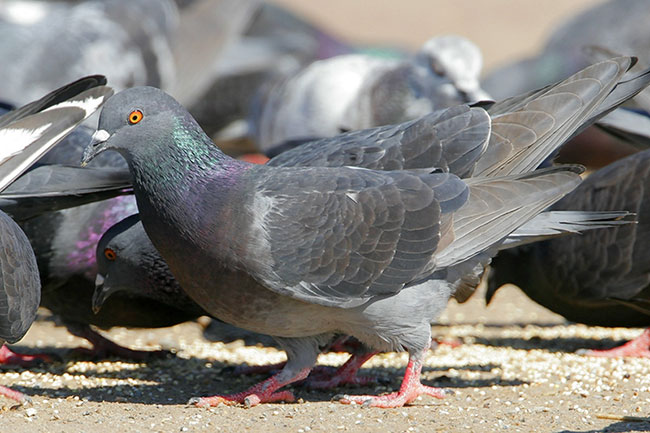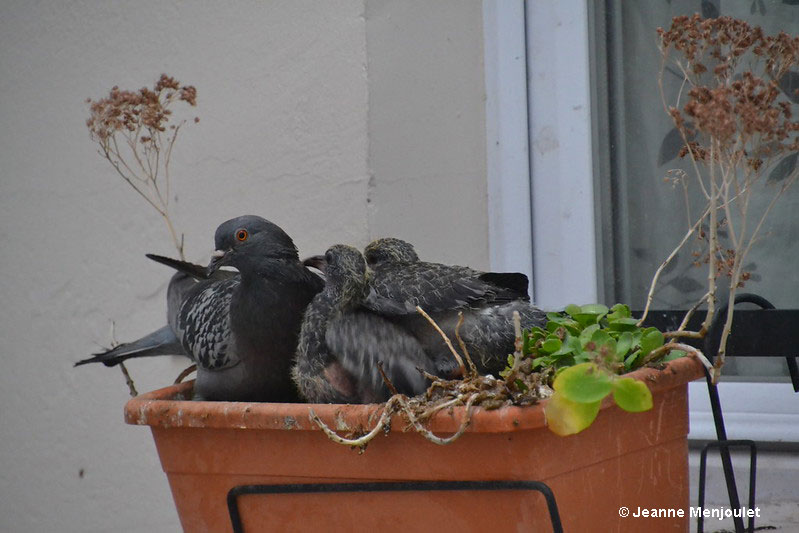
Pigeons are true city birds! They are so familiar, pigeons must be some of the least appreciated birds on the planet. Although some folks, unfortunately, refer to them as “flying rats,” pigeons have beautiful iridescent highlights and interesting behaviors.
But what do pigeons eat in cities? How do they find their food, and how are they even able to thrive in different towns?
On this page
What Do City Pigeons Eat?
City pigeons or “feral Rock Pigeons” are adaptable birds that can survive on a very limited diet. They eat all sorts of grains, small fruits, seeds, and other bits of food that people give them.
They can eat some invertebrates but, for the most part, city pigeons are vegetarians with a strong preference for seeds and carbohydrates.
See more: Types of doves in the U.S.
These hardy birds aren’t picky about what they eat, either! After roosting for the night, pigeons fly to parks and city streets to look for food. As they walk around, they keep an eye out for any possible food items and pick them off the ground.

In cities, those items often take the form of bits of food that people have thrown away, along with seeds from weedy plants. This is why we often see pigeons feeding near or underneath garbage bins. They are picking up bits of bread and other food they manage to find.
However, most of all, city pigeons eat food that people give them. A lot of urban pigeons have a steady diet that consists of popcorn, peanuts, birdseed, bread, and little else!
This is why we see pigeons flocking in urban parks; those are the places where people feed them the most.
Why are there so many pigeons in urban areas?
Pigeons are some of the most common birds in urban areas. However, was it always that way? When I have watched flocks of pigeons fly down city streets, I have often wondered where they came from. How did pigeons become city birds?
As it turns out, there are a few reasons why pigeons have become so adapted to living in cities. The main reason is that buildings are similar to the rocky cliffs where their wild ancestor Rock Pigeons nested.
Skyscrapers and other urban structures ended up being a suitable substitute for those rocky canyons and cliffs. City pigeons nest on building ledges and thrive, but the birds also need plenty of food.
Related: How similar are pigeons and doves?
Pigeons don’t have any problem there because they love to eat some of the same things that people do. They can get by on bits of food scraps, are helped by many people who actively feed them, and round out their diet with seeds and other plant matter that they find in urban parks.
The third main reason why city pigeons do well in urban areas is because they are simply accustomed to people. Most city pigeons are descendants of domesticated Rock Pigeons that escaped or were released into urban zones.
What Do Pigeons Eat In The Wilderness?
City pigeons can live off popcorn and birdseed, but what about birds in wild areas? Not all feral Rock Pigeons reside in cities. Many also live on farms, and other wild pigeon species live in forests.
The Rock Pigeons that live in farmlands might not eat as much bread as their urban cousins, but they still have a similar diet. They do very well in farming areas because they can nest in barns and other structures and find an abundance of food.
Related: How long do pigeons live?
Pigeons love to feed on fallen grain and do very well with a diet of corn, oats, barley, and similar plant matter. On a farm, they don’t have to go far to find that food either. There’s always some grain spillage, and they can become especially common in places where grain is stored.
The true wild Rock Pigeon of Eurasia also feeds on grain and seeds but may feed on more wild plants. There are also a couple of native pigeon species in North America that live in wild areas.
The Band-tailed Pigeon forages for acorns and seeds in western North America. The second species is the White-crowned Pigeon, a wild pigeon of southern Florida that feeds on tropical fruits.
Should You Feed Pigeons?
It’s alright to feed pigeons, but there are some reasons not to feed them. Pigeons can eat corn, birdseed, and most other food we give them. They’ll be fine, and many people also find that feeding them is therapeutic.
Sitting on a park bench while city pigeons eat birdseed at close range or from your shoulders can be a great way to relax and reconnect with nature. In places with few natural areas, this simple act can have a big, positive effect on a person.
With that in mind, feeding pigeons in cities can be a very good thing. It benefits both the people who do it and the pigeons.
However, there are a couple of downsides to feeding pigeons in urban areas. Rats and mice also like that extra seed and other bits of food. If too many people feed pigeons, the small rodents can take advantage of the situation and increase their numbers.
Giving city pigeons an abundant source of food can also cause pigeon numbers to increase. That might not be so bad but large numbers of pigeons also means large numbers of pigeon droppings.
However, on another note, larger pigeon populations also help the Peregrine Falcons and other raptors that prey on them.
What Do Baby Pigeons Eat?
Baby pigeons eat a nutrient and energy-rich substance known as “crop milk.” For the first four days after hatching, both parents regurgitate this specialized food and feed it to their babies. It is produced from the lining of the adult bird’s crop and gives the baby birds much-needed protein and energy.

By the fifth day, adult pigeons continue to give crop milk to their babies but also start to feed them seeds. They follow this diet for another four days or so and stop giving them crop milk by the 9th day after hatching.
Related: How common are albino pigeons?
After that time, baby pigeons are fed the same types of foods that adults eat. This diet includes corn, oats and other grains where available, bird seed, and other seeds from weedy plant species. Occasionally, Rock Pigeons also feed their young an invertebrate or two and berries.
Fun Facts About Pigeons
- Wild Rock Pigeons are much less common than feral city pigeons. Unlike urban birds, wild Rock Pigeons have not become accustomed to living with people.
- Pigeons are very fast birds. Their average flight speed is 60 miles per hour, and they can fly much faster!
- There’s evidence that Rock Pigeons were domesticated by ancient Egyptians more than 5,000 years ago.
- In cities, pigeons can live off of the scraps of food that people throw away!
- If pigeons have enough food available, they can raise 5 broods in one year.
- Band-tailed Pigeons feed on a variety of seeds and nuts. When they eat acorns, they remove the cap and swallow the nut whole!
- White-crowned Pigeons and other pigeon species that live on islands often fly long distances within and between islands to feed on fruiting trees.
Frequently Asked Questions
How do pigeons find food?
Pigeons find food by walking on the ground and picking up seeds and other bits of food with their beaks.
Is it OK to feed pigeons?
Yes, it is OK to feed pigeons. They prefer foods like corn, birdseed, and peas.
Do pigeons eat meat?
Pigeons are primarily vegetarian, so they do not eat any meat.
What should you not feed pigeons?
You should not feed pigeons junk food, candy, chocolate, avocado, raw beans, onions, or garlic.

